- Latest articles
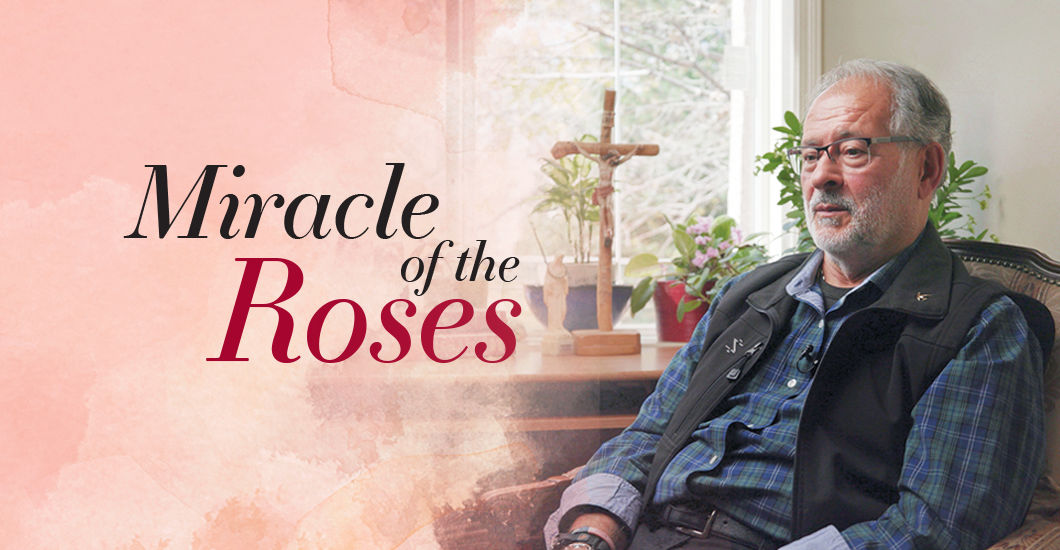
One evening, my wife told me she had invited a Rosary group to our home. They would be bringing a statue of Our Lady and praying the Rosary. I shrugged it off because I had no belief in the power of prayer. I could not rationalize how uttering words could bring about a meaningful relationship with God.
To prepare a beautiful setting for the statue of Our Lady, my wife bought two vases of brilliant red roses. The prayer group brought the beautiful statue of Our Lady. When they arrived, I fled to the background. But as the Rosary was recited, I stood at the rear of the room looking at the statue and wondering about the Rosary. Questions like: “Are we really praying to a statue?” popped into my mind. But I also found myself asking, “Are you really present here? I really need to know!” I felt like saying, “I need a sign to show me you are here”.
My eyes fell on the brilliant red roses and I prayed, “If only you could change the color of one or two of those roses…” The next morning, I rushed to work. When I came home in the evening, my wife met me at the door exclaiming excitedly, “Have a look at the roses…Somebody must have asked for a sign.” When I glanced over to check them out, I was astounded to see pink roses instead of the brilliant red roses. It left me breathless. Regaining my composure, I told my wife, “Honey I think somebody did ask for a sign…and that somebody is me.” My wife burst out in delight, “It’s a miracle!”
I examined them carefully to see if the pink roses were a different variety than the red roses, but they were clearly identical except for the colour. Truly it was sign from Our Lady telling me, “I am here. I am here to help you. Call on me”.
From then on, I began to “pray” the rosary rather than “say” the Rosary. Every time I pray the Rosary with all my heart, it is an enormously powerful experience of our Heavenly Mother. She is always at my side, holding my hand, and walking with me on the journey of life.
'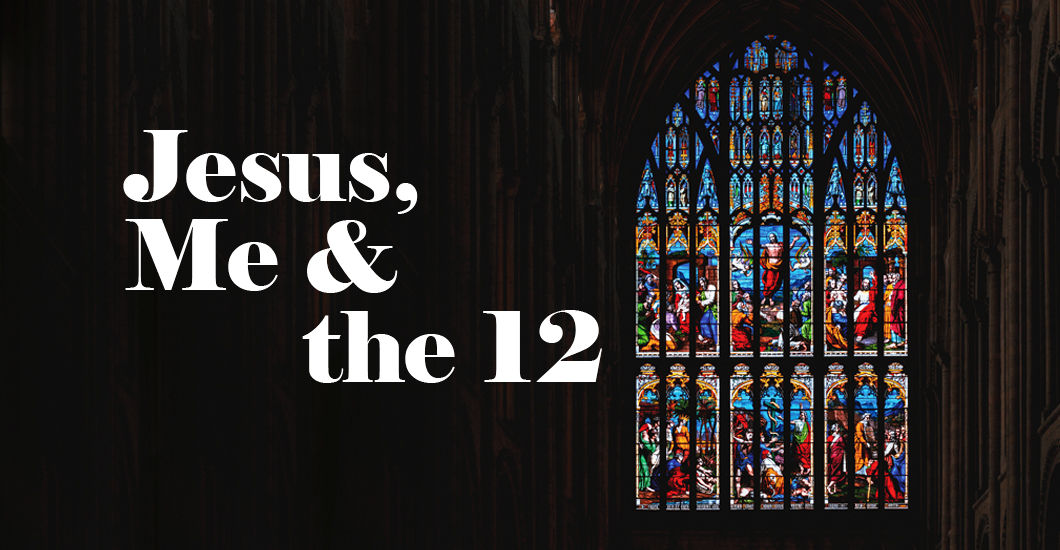
As I sat in Mass listening to the priest proclaim the Gospel according to Luke (6:12-19), I heard the words with fresh ears and understood them in a way I never had before.
The message of the Gospel: Jesus chose Twelve. Twelve! Out of all of His followers, he chose only Twelve. What did it take to become one of the Twelve? I wondered what Jesus prayed on the mountain the night before. Was the decision difficult to make or was the deliberation brief because the soon to be Twelve Apostles were an obvious choice? What criteria did Jesus use to make his decision?
Then, all of a sudden, my heart started to pound and I saw RED. A bit of panic came over me as I placed myself inside the Gospel story. Imagining myself among the other disciples, standing there quietly waiting for the names of the chosen Twelve to escape the lips of the Son of God, I looked around at those beside me.
Suddenly, I was struck by the gravity of every decision I had ever made, each action I had taken, and every word I had spoken. Jesus was choosing His core group of followers—the ones who would carry out His works. My mind ferociously scanned over my own life and I couldn’t help but ask myself, “Am I living in such a way that Jesus would have chosen me? Would I have made the cut?”
Certainly, there were many disciples, not chosen to number in the Twelve Apostles, who accomplished incredible works in the name of the Lord. Good works were not exclusive to the Twelve, but we know the Apostles did play a very intimate, integral role as Jesus’ closest friends and followers. To have been selected was an unparalleled honor. Additionally, Jesus gave us a glimpse of His incredible love and mercy by including Judas Iscariot among the Twelve. Even though Judas would later betray Jesus I don’t think we can argue the Twelve were a very special, handpicked group of followers.
What would it have been like to be one of the Twelve?
Maybe the Apostles were grateful and excited, but also nervous about the path the Lord had chosen for them. Did the other disciples react in disappointment because they were not chosen among the Twelve, or was there a feeling of relief because the road laid out before Christ’s Apostles would certainly be difficult?
Just to be chosen was a sacrifice. Becoming an Apostle would prove to be a heavy cross to carry. Being chosen was just the beginning.
The Christian life isn’t easy, but the reward is divine.
Do you live your life to be “chosen” or do you live your life to simply get by?
'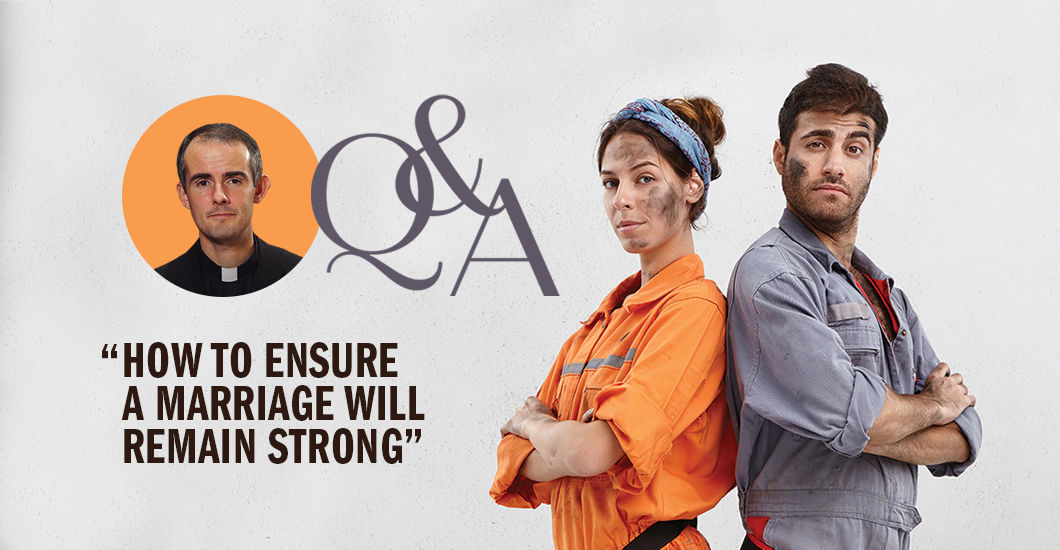
Question: I am preparing to be married in a few months, but the idea of such a lifelong commitment fills me with anxiety. I know so many marriages that end in divorce or misery – how can I ensure that my marriage will remain strong and full of happiness?
Answer: Congratulations on your engagement! This is an exciting time in your life, but also an important time to prepare – not just for the wedding, but for the many years of marriage that God will bless you with!
Humanly speaking, marriage is a difficult reality, because it puts two very imperfect people together into one family…for the rest of their lives. But thankfully, marriage is not just a human reality: it was established by Christ as a Sacrament! As such, it is a source of grace for all who enter into it – graces that we can tap into at every moment!
So, the first step to a happy marriage is to keep God at the center of it. Venerable Fulton Sheen wrote a book entitled, “Three to Get Married,” because the marriage is not just between a man and a woman it also includes a third person– God, who must remain at the center. So pray together as a couple, and pray for your spouse.
The more time you spend with God, the more you will become like Him – which is good, because you will need to develop virtues as you go through your married life! Patience, kindness, forgiveness, honesty, integrity, and self-sacrificing love are indispensable virtues. Even before your marriage, work on growing in these areas. Go to Confession regularly as you seek to grow to be more like Christ. Pray for these virtues; practice them daily—especially forgiveness.
A good marriage never exists outside of a wider community, so surround yourself with mentors in your marriage – couples who have been married for a while and have weathered a few storms but have come out stronger. You can turn to them for advice and inspiration when rocky days come. Not all of these mentors need to be alive: some great saints lived the married life, such as St. Louis and Zelie Martin, or St. Monica, whose difficult marriage made her a great saint.
Your marriage WILL be attacked – the Evil One hates good marriages, because marriage is the clearest icon of the Trinity here on earth. Just as the Trinity is a life-giving community of love, as three Divine Persons give of themselves to each other for eternity, so a good marriage should be a visible example of that here on earth – two persons who give of each other to their spouse so fully that their love results in new people being created (children). So the Devil abhors marriage with a special hatred. Prepare yourself for spiritual warfare, then. Usually that takes the form of a natural human disagreement being blown out of proportion. Perhaps you have a small disagreement and all of a sudden thoughts of divorce start nagging your mind; perhaps you will be tempted, as soon as you are married, to daydream about other husbands or wives; perhaps you will just find yourself too distracted to spend much time communicating with your spouse.
Resist these attacks! As Protestant author John Eldredge likes to say, marriage involves two people “back-to-back with swords drawn”. The enemy is NEVER your spouse – you two are a team, bonded by vows and grace, fighting for your marriage by fighting the true Enemy, the Evil One.
And we have many weapons! The Sacraments, the Word of God, prayer, fasting…all of these should be a regular part of your marriage. Rest secure that God will give you the grace to live out your vows, come what may. He is always generous with those who are generous with Him; He is faithful to those faithful to Him. Study the Church teaching on marriage and family, such as the encyclicals Humanae Vitae and Familiaris Consortio, or the “Theology of the Body” or “Love and Responsibility,” and conform your marriage to this beautiful vision for married love that the Church proposes.
Most of all, never give up! Once when I was teaching a religious education class, I brought in a couple who had been married for over 50 years. They gave a great presentation about their marriage, and then they asked the kids if they had any questions. A precocious 12-year-old boy spoke up and said, “Did you ever think about splitting up?”
There was a great deal of awkwardness in the room. Reluctantly, the wife said, “Well, yes, there have been days…” Her husband looked at her with surprise and replied, “Really? You too?”
They persevered – and made it to 50 years. I pray that your marriage will do the same!
'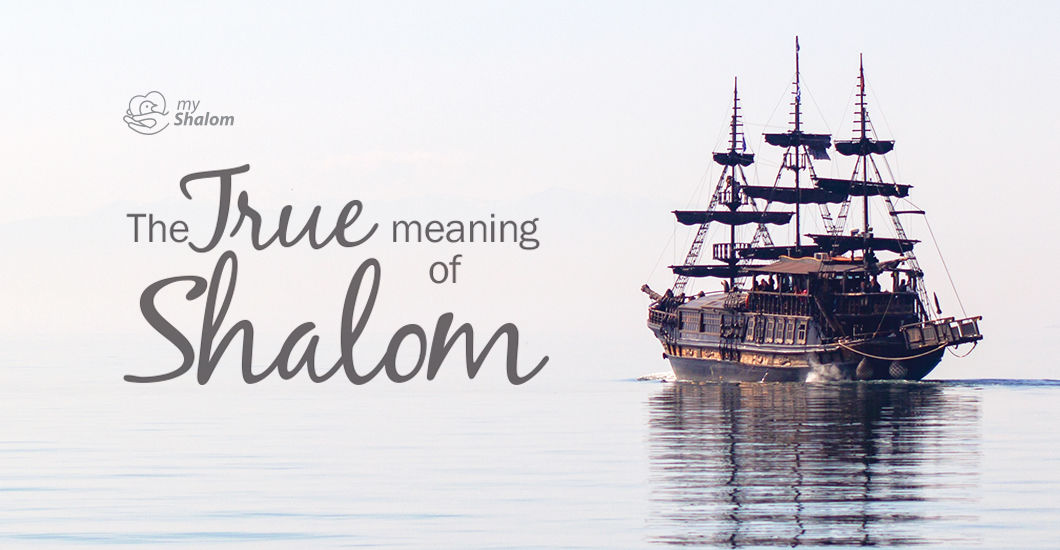
As an Author, Storyteller and National Speaker he seeks to emanate the light of Christ to the whole world. Meet Graziano Marcheschi the Senior Programming Consultant of Shalom World as he beautifully describes the essence of Shalom ministry.
Prelude
They don’t come often. Days of singular focus where everything works together and everything hangs together; days free of crippling self-awareness when we surrender to the flow and the unfolding of events …and of God’s grace.
Such was my daughter’s wedding day.
I awoke happy, looking forward to the day without any of the father-of-the-bride wedding day jitters. Everything was just as it should be. Throughout the day, I found peace in every moment. The Mass, presided over by our local archbishop, was perfect—his homily a brilliant breaking open of the word of God. The reception, my father-of-the-bride toast, the 20-foot-long banner unfurled on cue by my nephews professing a father’s love for his little girl—all holy, all part of a seamless flow. Nothing could disturb the perfect balance. Even my daughter-bride’s frantic whispers in my ear that the caterers were serving the “wrong” menu brought no alarm. “What do you mean, ‘the wrong menu?’” I asked “It’s not what we ordered!” she stressed. But the food was good. Too good to upend the equilibrium of that special day. I visited with friends and family members. “Thank you so much for including us,” one said. “Of course, of course!” It all went by so fast, so smoothly, so like it was being guided from somewhere far beyond.
But the real grace of that day, what made it exceptional and unique, was my lack of self-awareness and self-preoccupation. Of course, I was there. I wasn’t withdrawn or in a daze. I was fully aware, though not of myself, but of all that was beautifully, gracefully unfolding among us. It was a rare magic I’ve tasted but a few times in my life.
A Puzzle
When I first encountered Shalom World ministries, I wondered why a Catholic organization would adopt such a Jewish name. Friends who know of my work with Shalom often ask the same question. So, I decided to look deeper to better understand a word that’s peppered my vocabulary for as long as I remember.
Like the Italian “Ciao” or Hawaii’s “Aloha,” Shalom is a prosaic word used to greet and bid farewell: “Shalom!” when you meet someone. “Shalom!” when they leave. Though most commonly translated as “peace,” shalom holds a much deeper meaning for the Jewish people from whom we’ve borrowed the word. Much more than the absence of conflict, shalom implies a sense of completeness and wholeness. The word derives from the verb “shalem” which suggests a fullness and oneness in body, mind, and state of life. It celebrates an inner tranquility or harmony that manifests itself in the urge to give back, to restore and to make something whole.
When a Jewish person greets another with shalom, they are wishing them health, well-being, and prosperity. The same is true when Jews or Christians bless someone with the famous invocation from the Book of Numbers: “The LORD bless you and keep you! The LORD let his face shine upon you and be gracious to you! The LORD look upon you kindly and give you peace!” (Numbers 6: 24-26). This is not the “peace and quiet” that we sometimes scream for in times of stress. It is a tranquility and harmony that we can’t manufacture and which only God can give us. Only from God himself, from “his face” shining down upon us, from his protection encircling us, can we receive the inner peace and completeness that are the real meaning of Shalom.
Scripture identifies God with peace to such an extent that Shalom becomes a name of God. In the Book of Judges (6:24) Gideon builds an altar to the Lord and calls it “Yahweh-Shalom” (“God is peace”). When we wish shalom to someone, we are wishing God upon them.
A Foretaste
Through a Christian lens, shalom becomes another word for the kingdom of God. In its deepest sense, the kingdom is Jesus Christ himself. In his person, Jesus embodies God’s kingdom. When he says, “The time is fulfilled and the kingdom of God is at hand” Jesus announces that in his person, as both God and man, heaven and earth have met and God’s kingdom, God’s very presence, is now among us. And what do we understand the kingdom to be but God’s rule over us, his reign extended through the earth, a manifestation of the very attributes of shalom—completeness, safety, tranquility, harmony, and peace.
In a book entitled Not the Way It’s Supposed to Be: A Breviary of Sin, author Cornelius Plantinga presents the Hebrew bible’s understanding of shalom this way:
“The webbing together of God, humans, and all creation in justice, fulfillment, and delight is what the Hebrew prophets call shalom. … In the Bible, shalom means universal flourishing, wholeness and delight – a rich state of affairs in which natural needs are satisfied and natural gifts fruitfully employed, a state of affairs that inspires joyful wonder as its Creator and Savior opens doors and welcomes the creatures in whom he delights. Shalom, in other words, is the way things ought to be.”
What a perfect description that is of the kingdom of God.
As Christians, when we say shalom, we wish for the fullness of the Kingdom. We pray for God’s governance over us as individuals and as nations. We long for the fullness of the Holy Spirit’s indwelling in us. Shalom on the lips of Jesus was a reminder to the disciples that what he brought was but a foretaste of what was to come in the fullness of God’s kingdom.
This understanding of shalom is what I experienced on my daughter’s wedding day—a sense of harmony, the absence of struggle and of self-preoccupation, the letting go of fear and trusting effortlessly in the providence of God.
That’s why Jesus rebuked more than the winds when the disciples cried out, “Lord, save us! We are perishing!” in response to the sudden storm that filled them with terror as Jesus lay asleep in the back of the boat. He took them to task because he was disappointed that they had surrendered shalom. They weren’t simply anxious; they were afraid at their core. They forgot they weren’t in real danger because the lord of heaven and earth was in the boat with them. They feared he would let them down, sleep through the danger and let them drown. But true shalom means knowing we are never in mortal danger; remembering we are always in the hands of the lord of heaven and earth. It means trusting, at the core of our being, that in God’s hands we find safety, comfort, harmony, and peace.
If you wanted to create a ministry to bring the good news of the gospel to millions around the world, if you dreamed of a print magazine, television programming, and round the clock prayer that encourages readers and viewers with the message of Jesus— “I have told you these things so that in me you may have peace. In this world you will have trouble. But take heart! I have conquered the world” (John 16:33)—what would you call that ministry?
How about Shalom World?
'
Life in my family has been a journey of both joy and sorrow. Love and joy have often been overshadowed by loss of friends, failure in exams, changing schools and housing troubles. I have experienced great misery and loneliness throughout these trials, but despite this, I would cling to the help of Our Lady who would support and comfort me.
Starting high school was a great change in my life. Many of my friends and schoolmates from primary school had moved away to other high schools so I had to try to fit in with new people and find the ones who would be my friends. There was far more work and assessment in my new school and it was difficult without a close friend by my side.
As the months passed, I wondered if these hardships and trials would ever come to an end. I prayed to Mother Mary for comfort during these hard times and started a ‘Do-It-Yourself’ retreat by Fr Michael E. Gaitley called “33 Days to Morning Glory” to prepare for consecration to Mary. Each day of the retreat includes a daily reading from the saints. I was inspired by key passages from the teachings of Saint Louis De Montfort, Saint Maximilian Kolbe, Saint Teresa of Calcutta and Pope Saint John Paul II. This book deepened my relationship with Mary and trust in her motherly care as I reflected on what I read while I prayed the Rosary every day.
Now, when I am consumed by stress or worry, I simply pray the Rosary and I can sense Mother Mary’s comforting hand on my shoulder. “While I recite the Rosary, I am holding the hand of the Holy Mother. After the recital of the Rosary the Holy Mother holds my hand” (Pope John Paul II). As my love and trust for Mary deepened with each day of the retreat, I no longer felt sad and lonely at school. Praying the Rosary and other Marian prayers brought about a great change in my spiritual life. On the day of consecration, I woke up early in the morning to pray the consecration prayer. As the words passed my lips, my heart bubbled over with great joy and happiness as I revelled in the knowledge that I was finally consecrated to Mary.
Many of us, faced with similar difficulties in our lives are often unsure about what to do or where to go. Let us take this opportunity to trust in Our Lady’s intercession. We need to remember that Mary experienced many sorrows and hardships when she was on earth and can understand exactly how we feel. Taking her hand and asking her to accompany us in our sufferings can lead us to ‘a path of roses and honey.’
Let us pray this powerful prayer asking for Mary’s help during the difficulties in life:
Mother of God and our Mother,
Pray for us to God, our merciful Father,
That this great suffering may end and that hope and peace may dawn anew.
Amen.
'
Having a bad day? Get out of the “‘stinkin’ thinkin’” now!
I woke up grumpy and out of sorts this morning. You know the saying, ‘I got up on the wrong side of the bed’—that was me, for sure. It certainly wasn’t good to start the day like I ate a bunch of sour gummy worms. However, as I sat at my kitchen table eating breakfast and reading my daily scriptures, I opened the front door to let the sunshine and brightness in.
Then it happened!
I heard the glorious sound of a symphony of birds singing. I sat there with my eyes closed and listened, as the birds were praising their Creator for yet another day. “Beside them the birds of the heavens dwell; they sing among the branches.” Psalm 104: 12.
It was as if the Holy Spirit poured into my heart a melody of praises. My grumpiness crumbled in the midst of the choir of birds joyfully chanting praises to God, their Creator. “Oh come, let us sing to the Lord; let us make a joyful noise to the rock of our salvation!” Psalm 95.
This Holy Spirit moment helped me realize that my best shield, to deflect a bad mood, is to sing praises to Our God. I am not sure if birds ever have a bad day or get grumpy. But even if they do, they still sing praises to their Creator. Jesus tells us: “Look at the birds of the air: they neither sow nor reap nor gather into barns, and yet your heavenly Father feeds them. Are you not of more value than they?”
I have heard it said that the way to stop stinking thinking is to counter it with three positive thoughts. A sure remedy, to bring myself out of a negative attitude, is to read the Psalms and thank God for all my blessings and His loving care for me and my family and friends.
Sure, sometimes I just want to stay in my stinking thinking world for a while with its doom and gloom. But then the Holy Spirit invites me to sit down on my deck, close my eyes and listen to the orchestra of birds singing. When I do, I breathe in the Light of Christ, changing my gloom into a joyful attitude of thanksgiving and praise.
Thank you, Jesus for showing me, through the singing birds and the wildflowers, that I too can rejoice and sing praises to Our Creator. “The flowers appear on the earth, the time of singing has come, and the voice of the turtledove is heard in our land.” Song of Solomon 2:12
'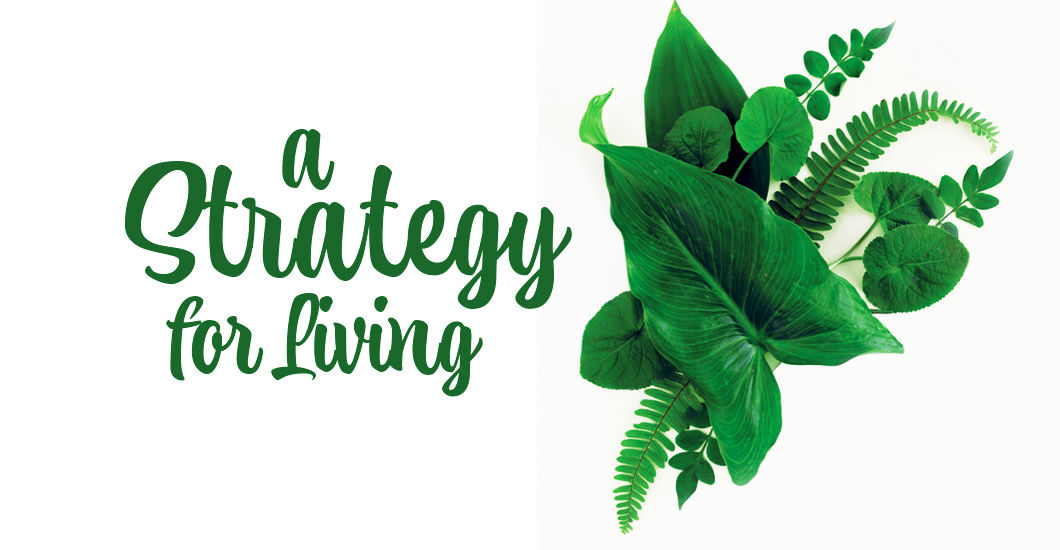
Little did I know that a simple family hike would help me decipher a life-changing strategy…
Last year, my son wanted us to visit his college campus. Though I had seen the expansive university grounds and the mountains cradling them, his father and siblings had not. As restaurant owner/operators, scheduling the five-hour road trip and time away presented challenges, but I determined to make it happen. Since we could not manage more than a one-night retreat, I told my son to make the best use of our limited time. He chose a family hike.
Will Over Ability
I admit that at 49 I am more soft than firm. My regular exercise includes moving laundry bins, bending to pick up stray socks and forgotten books, and climbing the three sets of stairs in our house. When I planted my first step on the trail, I knew my will, not my ability, had to propel me forward.
Quickly I fell to the rear as the others had greater stamina and lung capacity. A few yards into the ascent, my breathing became shallow and labored, and my calves stung from the contraction of my out-of-shape muscles. I realized I needed a strategy to complete the hike.
I decided to let go of the big picture and focus on the details. Rather than concentrate on the three-mile trek, I would think about the next step. Often big-picture thinking makes me anxious, but attention to details tethers my mind to the present moment. I resolved to savor each observation and not stew in the what if’s (what if my legs quit? what if I run out-of-steam? what if I can’t keep up?…).
The Unseen World
Soon, my mind became enraptured with the beauty of creation, I forgot the big picture altogether. I heard the gentle whistle of the wind and the rustling of leaves beneath the joyful chatter of my children. As I worked to keep pace and my lungs adapted to the exercise, a flush of warmth radiated across my skin. The soft green hue of plants still in bloom on the mountain floor caught my eye, as did the puzzles of bare, twisted vines in the fall canopy. My mind’s eye opened to the unseen world above, below, and beside me. Stepping on the hard soil, I conjured images of insect armies marching nearby. I day-dreamed about the lives of the many creatures that inhabit our world: birds nesting in bare trees, rodents burrowing underground, and countless bugs climbing, flying, and marching. I thanked the all-good God for every single creature and every inch of the magnificent landscape he had placed me into that afternoon.
Strategy Found
At one point, I stopped to photograph a tree stump in order to remember that the now-decaying tree was part of God’s plan for this mountain. In time, the stump will disappear, and its donation will be absorbed into the mountain itself. As I focused my camera on the dying tree, a rainbow streamed across the image. I remembered the covenant between God and humanity. I recalled that it continues today, and I thanked God for his faithfulness.
My steps came easier when I wasn’t counting. The journey became light when I laid down the yoke of what-ifs and invited Christ to walk alongside me. When temptation pushed in, I drew closer to Jesus. Rather than denying the challenge or becoming overwhelmed, I offered a prayer of surrender and entrusted my walk to his care.
At the start of 2021, what I learned on that mountain hike is still unfolding. As the world spins into chaos anew, I am understanding the value of the present moment. While big picture thinking is important for mapping directions and establishing goals, it can rob us of the beauty, peace, and fellowship of the present moment.
Freedom Awaits
Had I focused on the length of the hike and my insufficient capabilities, I might have sat it out. Instead, I discovered a treasury of beauty and blessing. Instead of obsessing over the big picture I am now focusing on the present moment. Snuggling on the couch with a loved one, reading a book aloud, pouring myself a mug of coffee and inhaling the aroma, or calling a friend and laughing together. I am becoming more attentive and finding more ways to put my love into action.
My simple hike up a hill resulted in a new strategy for my life: being attentive to the present moment and expressing gratitude for the blessings in it.
This strategy is making my journeys easier (whether hiking up a mountain, completing a daily task, carrying a heavy cross, or living through this unprecedented time in history). Living in the present has become the key to unlocking freedom, a freedom no one can suppress. Christ is in the present moment. Let’s look for Him there where we are sure to find Him.
'
I asked the Lord, “Why, why this cross in our lives?” And He gave me an incredible answer!
Like Simon of Cyrene, it is the vocation of every Christian to carry the Cross of Christ. This is why Saint John Marie Vianney said, “Everything is a reminder of the Cross. We ourselves are made in the shape of the Cross.” There is a great deal to unpack in that seemingly simple but profound teaching.
The sufferings we experience allow us to partake in the suffering of Christ. Without the willingness to embrace suffering for the sake of Christ, we cannot fulfill our Christian mission on earth. Christianity is the only religion that recognizes the salvific aspects of suffering and teaches that suffering can help us attain eternal salvation—if we join it to Christ’s own suffering.
Venerable Fulton Sheen said that unless there is a cross in our lives, there never will be a resurrection. Jesus himself tells us what is required to be His disciple, “If any man would come after Me, let him deny himself, take up his cross and follow Me” (Matthew 16:24). Again, Jesus says in Matthew 10:38, “He who does not take his cross and follow Me, is not worthy of Me.”
Jesus died on the Cross to save the world. After His death, He ascended into Heaven but left the Cross in the world. He knew that anyone who wants to join Him in Heaven will go there by way of the Cross. Saint John Vianney also reminds us that “The Cross is the ladder to Heaven.” Our willingness to embrace the Cross allows us to climb that heavenly ladder. There are plenty of ways to destruction, but there is only one way to Heaven—the way of the Cross.
Depths of My Heart
In 2016, while I was studying for my Masters, my mother began to show signs of weakness. The doctors suggested a biopsy. During Holy Week, we received the report that my mother had cancer. My family was devastated by the news. That evening, I sat in my room and stared at a statue of Jesus carrying His Cross. Slowly, tears flowed from my eyes as I complained to Jesus: for the last two years I almost never missed Holy Mass, I prayed rosaries every day and I gave a lot of time working for the kingdom of God (I was quite active in Jesus Youth at the time). My pious mother was very devoted to Mother Mary. So I asked Jesus from the depths of my heart, “Why, why this cross in our lives?”
That Holy Week, I went through a great agony. As I sat in my room gazing at the statue, a thought entered my mind. Jesus is alone carrying His cross. After a while, I heard a voice in my heart saying, “Josin can you help Me carry My Cross?” I realized what Jesus was calling me to do and my vocation became clear. I was to help carry the Cross of Jesus, like Simon of Cyrene.
Around that time, I made a visit to one of my mentors in Jesus Youth and shared with him the pain I was undergoing since my mother’s cancer diagnosis. After hearing my troubles, he gave me but one piece of advice: “Josin, in praying for your present situation, you will find one of two answers: either God will heal your mother completely, or else He has no plan to heal this illness but is giving this illness as a cross to bear. But if that is the case, He will also give you and your family the grace and strength to bear it.”
I soon came to understand that God was answering my prayers in the second way. But he gave me the grace and strength to carry His cross; and not only for me, but to my whole family. As time passed, I began to realize that this cross of cancer was purifying our family. It increased our faith. It transformed my father into a man of prayer. It helped and guided me to choose the religious life. It helped my sister to grow closer to Jesus. This cross eventually helped my mother to go peacefully to the heavenly Jerusalem.
The Letter of James (1:12) says “Blessed is the man who endures trial, for when he has stood the test, he will receive the crown of life which God has promised to those who love Him.”
By June of 2018, my mother’s illness had taken a turn for the worse. She was under tremendous pain, but surprisingly, she remained joyful. She said to my father one day, “Enough of all this treatment. After all, I am going to heaven.” A few days later, she woke from a dream and said to my father “I saw a dream”. But before she could elaborate, Celine Thomas departed from the world, completing her earthly pilgrimage.
Over the course of two years, through 30 chemotherapies and two major surgeries, she carried her cross faithfully without relief from her pain. I am now certain that she is looking upon the glory of Christ, face to face.
The Secret
Can we imagine our Lord telling us, “I have many friends at My table, but very few at My Cross?” During Jesus’ crucifixion Mary Magdalene stood courageously before the Cross. She sought to be with Christ in His suffering. And because of this, three days later, it was she who first saw the glory of the Risen Lord. This encounter transformed her sorrow into joy and made her the Apostle to the Apostles. The great Carmelite mystic Saint John of the Cross says, “Whoever does not seek the Cross of Christ does not seek the glory of Christ.” The glory of Christ is hidden in His Passion. This is the wonderful secret of the Cross! Saint Peter reminds us, “Rejoice in so far as you share Christ’s sufferings, that you may also rejoice and be glad when His glory is revealed” (1 Peter 4:13).
Like Saint Mary Magdalene, if we stand at the foot of the Cross with a willingness to suffer with Him, we too will encounter the risen Lord, and He will turn our messes into messages, our tests into testimonies, and our trials into triumphs.
Lord Jesus, I give myself wholly to you through the hands of Mother Mary. Give me the strength to carry my cross after You, all the days of my life. Amen.
'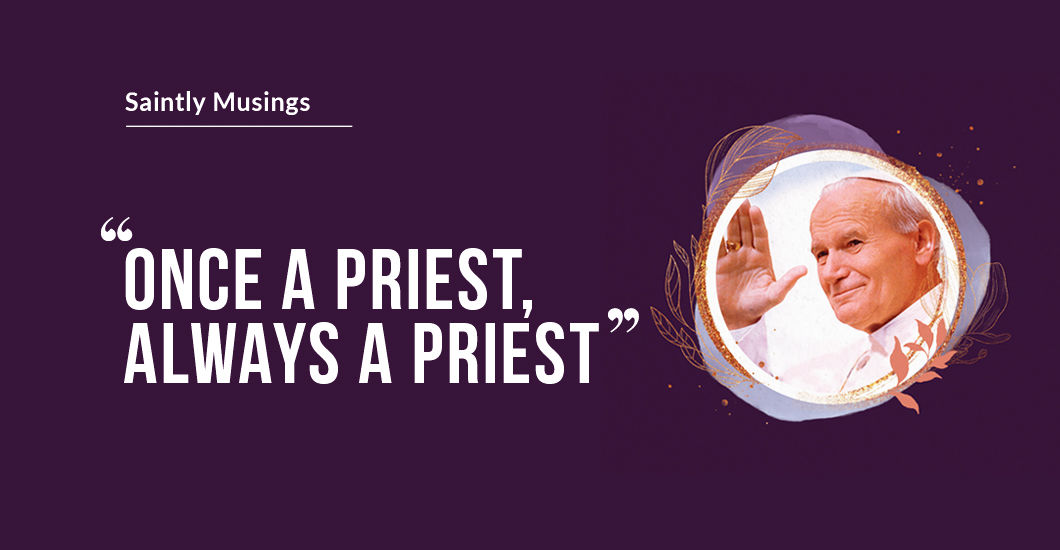
A priest was visiting Rome and had an appointment to meet Pope John Paul II in a private audience. On his way, he visited one of the many lovely basilicas. As usual, the steps were thronged with beggars, but one of them caught his interest. “I know you. Didn’t we go to seminary together?” The beggar nodded in affirmation. “Then you became a priest, didn’t you?” the priest asked him. “Not anymore! Please leave me alone!” the beggar replied angrily. Mindful of his approaching appointment with the Holy Father, the priest left promising, “I’ll pray for you,” but the beggar scoffed, “A lot of good that will do.”
Usually, private audiences with the Pope are very short—a few words are exchanged as he bestows his blessing and a blessed rosary. When the priest’s turn came, the encounter with the beggar-priest was still playing on his mind, so he implored His Holiness to pray for his friend, then shared the whole story. The Pope was intrigued and concerned, asking for more details and promising to pray for him. Not only that, he and his beggar-friend received an invitation to dine alone with Pope John Paul II. After dinner, the Holy Father spoke privately with the beggar.
The beggar emerged from the room in tears. “What happened in there?” asked the priest. The most remarkable and unexpected reply came. “The Pope asked me to hear his Confession,” choked the beggar. After regaining composure, he continued, “I told him, ‘Your Holiness, look at me. I am a beggar, not a priest.’”
“The Pope looked tenderly at me, saying, ‘My son, once a priest always a priest, and who among us is not a beggar. I also come before the Lord as a beggar asking for forgiveness of my sins.’” It had been so long since he had heard a Confession that the Pope had to help him through the words of absolution. The priest commented, “But you were in there for such a long time. Surely the Pope’s did not take that long to confess his sins.”
“No,” said the beggar, “But after I heard his Confession, I asked him to hear mine.” Before they departed, Pope John Paul II invited this prodigal son to take on a new mission – to go and minister to the homeless and the beggars on the steps of the very church where he had been begging.
'
It was supposed to be a good old-fashioned birthday party.
What we weren’t prepared for was God surprising us with His present!
Birthdays are a big deal in my family, not just because there is yummy cake and an abundance of presents. It is because we get to celebrate the day that God blessed the world with a new life. It is the day God chose to bring this unique person into our lives. I have always thought that was something worth celebrating and I wanted to pass that value onto our children. It was important that our children knew they were not only loved by my husband and I, but more importantly, they were planned and loved by God!
From time to time, we would give our children a good old fashioned birthday party. We would hold the event at our home, complete with vivid decorations, party hats, noise makers, games, prizes and presents. Then we had top it off with ice cream, a homemade, decorated cake and parting goodie bags. Their parties were not necessarily extravagant, but they were well thought out and took many weeks to organize. While all the parties we planned were fun and special, there was one party in particular that none of my family will ever forget. It was the party when God surprised us with His own present!
Birthday Galas
Our third son turned 12 years old in the latter part of May 2002. Our children were raised in northern Massachusetts, so by the time May appeared, everyone longed to be outdoors enjoying the spring weather. Our son was an athletic boy and with his input we decided on an outdoor basketball themed party Everything about that party was revolved around that theme, including a real game of basketball to be refereed by a couple of basketball playing, whistle blowing adults. The invitations were sent, uniforms were created, the basketball-themed cake was baked, food was prepared and the balloons were blown up. Although the decorations were ready, we planned to put them in place the next morning before the wonderful bunch of spirited boys arrived
Having orchestrated a number of these birthday galas in the past, the evening prior to the celebration, I felt very confident that everything was in place and ready for a wonderful, festive, energetic day until…a tiny thought way, way, way back in my mind began to steadily creep forward until the horror of it bubbled out into a disturbing question aimed straight at my husband. “Honey, what is the weather supposed to be like tomorrow?” The question hung in the air, like a lingering stench. We both knew that if anything but blissful sunshine and cool breezes were forecast, the outcome of the party would be at stake. These were the days of slower internet and we still relied on The Weather Channel for our forecast. My intense stare and panicky breathing set him fumbling for the TV remote. His face went ashen. Then he turned slowly to me. Carefully enunciating every word, he announced that steady rain was predicted for the entire day. I gasped! I had planned every single detail of that party and scheduled every event down to the minute, but I had forgotten to factor in the unpredictable, spring, New England weather! What was I going to do?
Sweaty Palms
It was 8pm and I did not have a plan B for tomorrow morning. The interior of our house was not at all set up to handle all those energetic boys. Suddenly, a thought crossed my mind. I could get on the phone and call every possible facility in the area that might have an indoor gym, explain my situation and humbly beg to use their basketball court for a couple of hours. However, the late hour meant that either no-one answered the phone or the gyms had already been booked for weekend events. I had called every location I could think of, with the exception of one gym. This one gym belonged to the local elementary school which my children had attended.
On several occasions, the Principal and I had certainly not seen eye to eye and I did not cherish the idea of humbling or indebting myself to her. However, it was clear that there were no other choices. It was a small town, most people knew each other and fortunately, I had her personal number. As her phone rang, my pulse raced, my throat tightened and I verified that women can indeed have sweaty palms. She answered. As I explained what I wanted and why, there was a significant pause on the other end of the line.
Finally, she said she would check to see if the custodial staff could let me in, but she would not know until after 9am the next day. My mind raced. I felt unable to relax without knowing, right then and there, that a successful Plan B had been orchestrated. The party was scheduled from 11am-2pm, so there was not much time to alert the party-goers of a change in plan if she did not call until after 9am. However, her tone warned me that I needed to be cautious in pressing the issue if I wanted to successfully appeal to her. Repeatedly and humbly, I thanked her before hanging up the phone.
We rechecked the weather forecast numerous times that evening hoping the unpredictable New England weather would fare in our direction, but there was no sign of hope…until…another, more positive thought popped into my head. “Perhaps this might be an extremely good time to pray. After all, wasn’t God in charge of the forecast?” Oh, I prayed and prayed and prayed. The party was only to last from 11am- 2pm, so I desperately pleaded with God for a break in the rain for those 3 hours.
The next morning started with drizzles and overcast skies. I had 3 more restless hours to wait before I would hear back from the school principal. My other options had run out, so I dejectedly continued to pray, not in faith, but in desperation. “Please Lord”, I begged. “Please don’t let it rain between 11am and 2pm”. The adrenaline was the only thing that held back the flood of tears behind my eyes. The phone remained silent as the clock steadily ticked past 9am. I asked my husband, “Do I call her or wait a bit longer?” Before he could reply, the welcome ring of the phone echoed through the stillness as we held our breath in anticipation. My voice shook as I tried to calmly answer the phone, I am sure I tripped over every syllable in greeting her. Without much ado, she told me we could use the gym for the party, but we were to clean it as if we had not been there. I wanted to thank her profusely, but she cut the conversation short and abruptly told me to be at the school gym around 11:15 am, where we would find the doors unlocked.
A Surprise Gift
My mental wheels began to turn, because there was now a solid Plan B to orchestrate. Although I still hoped and prayed that the steady rain would stop for those 3 hours, we had to move forward with the alternative plan for the day ahead of us. It seemed like only moments passed before it was time for the boys to show up. We were as ready as we could possibly be under the circumstances. Ten minutes before the first car pulled up, I peered out the window, and could not believe my eyes! I called my husband and directed him to look out and confirm what I had seen.
We stood there together and speechlessly gazed at the sight before us. God had answered my prayers. It had stopped raining, just as I asked and just in the nick of time. However, an uncommonly odd thing happened that we could never have anticipated. Although it had stopped raining, unpredictably, it had started to SNOW!!!! I am sure I heard God laughing and laughing. We stood there in momentary awe and wonder. We had never seen it snow that late in May in all the years we had lived in Massachusetts. We laughed at the sight, but could not linger on its meaning as the boys were starting to arrive for the party. Surprisingly, the Principal herself met us at the gym and told me she would work in her office for a couple hours, until the game was finished.
Everyone had a great time then helped us clean the gym so it looked even better than we had found it. We thanked the Principal and brought everyone back to our home for cake and presents. Before we knew it, 2pm came round and the boys’ parents began to slush up the snowy driveway to collect their sons. However, God was not finished with His joke and was about to present His grand finale. He made it clear that He had heard my prayers because at exactly 2:10 pm, the unforeseen snow turned back to a steady rain. The tears that I had held back earlier came flooding past my eyes.
Had God been attending our party? Had He shown that He answered my prayers by not allowing it to rain between 11:00 am and 2 pm? Had God been the orchestrator of Plan B, not me? Was it God who provided a place for us to have a great party while giving me a lesson on humility? Did God have a sense of humor? The answer to all those questions and more were YES, YES, YES, YES and unequivocally YES!!!
God teaches lessons in layers sometimes. When I look back, there were so many mistakes made when planning that party. However, God used my weaknesses to gently but humorously realign my thinking and conduct. Everything I do is accomplished through God who gives me strength. (Philippians 4:13*) Initially, almost everything about that day seemed to be accomplished through my own strength and pride. I never even thought to invite God to that party or into the planning process.
How shameful I felt when I reflected on the role my Creator had in bringing our son into our lives. He should have been the first invited guest and as it turned out, He was by far the most welcome guest. God answered my prayers, not in exactly the way I imagined, but in a clear manner, leaving no doubt that He intended to teach me something. God taught me that He’s always with me—listening, providing and wanting to be a part of the lives He created. He bestowed graces of humility, forgiveness and gratitude upon me in answer to my prayer. That party turned out to be extremely fun and memorable for everyone. After all was said and done, it did not rain between 11:00 am and 2:00 pm, just as I asked in prayer.…..
Instead, God brought His own present: SNOW!!! I am going to say it again……
God has a sense of humor!
'
The spiritual writer and poet John O’Donohue once wrote, “When you listen with your soul, you come into rhythm and unity with the music of the universe” (Anam Cara—Spiritual Wisdom of the Celtic World).
For a generation, the chosen people knew only the silence of God. In the book of Samuel, we read that the Word of the Lord was seemingly not happening: “a revelation of the Lord was uncommon” (1 Samuel 3:1). The people spoke, gave praise, pleaded, petitioned, and lamented—and nothing came back. Until, one night, a voice startled Samuel.
Samuel thinks it is Eli, the high priest of Shiloh, who might need help. But Eli sends the boy back to bed. After Samuel hears the voice a second time, Eli begins wondering if this might be the night the Lord breaks His silence and returns to Israel with a word of guidance. “If He calls you again,” Eli tells Samuel, “you shall say, ‘Speak Lord, for your servant is listening” (1 Samuel 3: 9).
CBS correspondent and 60 Minute host Dan Rather once asked Saint Mother Teresa of Calcutta about her devotional life. “What is it that you say to God when you pray?” She answered, “I don’t say anything; I just listen.” Perhaps a bit perplexed, Rather followed up: “What is it that God says to you during prayer?” Mother Teresa thought for a moment and said, “(God) doesn’t say anything. (God) just listens.” Teresa and God—sitting together, both quiet, and listening in silence.
Can we be still in the silence? Do we get restless wondering whether God is there, whether He’s paying attention, whether He really cares? In a letter to her spiritual director, Teresa confessed her doubts regarding God’s presence: “In my soul, I feel just that terrible pain of loss…of God not being God.” She added, “If I ever become a saint, I will surely be one of ‘darkness.’”
Sometimes prayer is patience in the darkness of the night, listening for a voice. But the question is: are we willing to listen the way that Samuel assured the Lord he was ready to do? “Listening” means we direct our hearts toward God, trusting that the subtle movement of His Spirit will do the rest.
Prayer is not something we can force. If we sense a movement to rest in God’s presence, that nudge is coming from God, Who always takes the initiative. Our part in responding to God’s invitation is to create a sacred space, minimize the distractions, and remain alert to God’s presence. Prayer is God’s gift to us and if we show up, He will always take us by surprise, which is, after all, what gifts are supposed to do.
How can we open ourselves to God’s presence? We do what Samuel did: we listen. We ask for the grace to listen with our full attention. Perhaps we get started with lectio divina, the sacred reading of Scripture, which can lead to a profound experience of listening. After we have mused on the passage, seeking understanding, and applying the passage to our lives, we have a conversation about what we have read. Then we rest in silence, being content to remain in God’s presence, without words or images.
For many of us, stillness doesn’t come naturally, especially in our super-charged, 5G, frenetic world where we flit from one distraction to another. The Jesuit theologian Karl Rahner once said, “We’re all meant to be mystics; if we don’t become one, we’ll destroy ourselves.” Prayer eventually moves towards stillness, a quality modeled by our Blessed Mother who continually pondered what she experienced as mother of the Messiah. Silence moves us into the currents of our hearts where we can experience our true feelings and discern where they are coming from. It is precisely in these deep currents that God speaks to us, revealing our innermost desires and fears to us, inviting us to reach toward communion and fellowship as we surrender our fears and hurts.
Listening to God requires surrender. To do that, we must first take the focus off ourselves and then make God the Center of our lives. Letting go of control is the beginning of listening to God. But surrender involves risks because God is going to take charge of our lives and suggest new ways of living our lives. When we put God in charge, we are making an act of faith that declares God’s Word is true, that He keeps His promises, and that He is trustworthy. We are saying that we trust God will pour himself into our silence and fill us with His Spirit.
With Samuel let’s extend the invitation: “Speak, Lord, for your servant is listening.” But when God does speak, be ready to respond the way Mary instructed the attendants to respond at the Wedding Feast of Cana: “Do whatever He tells you.” That’s the risk, that’s the cost, that’s the adventure of the inner journey into the mystery of God.
'